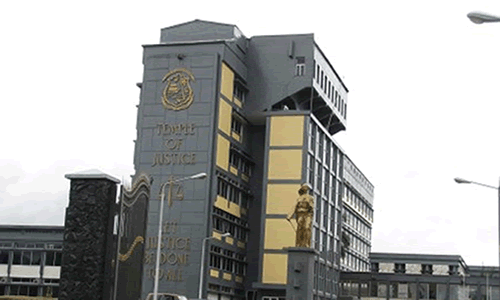Judge recuses himself from Oliver Dillon’s trial

Criminal Court “A” presiding Judge Roosevelt Z. Willie has recused himself from the alleged murder trial of Mr. Oliver Dillon, the brother of opposition Montserrado County Sen. Abraham Darius Dillon, insisting that the “court cannot change its view” that the elements for murder are not present [in the case].
Following his recusal Monday, 18 November, Judge Willie immediately ordered the clerk of court to transfer the case to Court “B” which has similar jurisdiction as the Criminal Court “A” to enable the prosecution conduct a speedy trial of the case.
Judge Willie’s decisions on Monday were in response to the prosecution’s request for his recusal from the case on the basis of an earlier decision he rendered by granting defendant Dillon’s motion to be placed on bail because the proof was not evident and presumption was not great” to hold the accused for murder.
Judge Willie grants the prosecution’s request to recuse himself because according to him, his previous decision on the defendant’s motion for bail did touch on the merit of the case and the court cannot change its view.
“(In) The case at bar,the defendant is charged for murder. This court says that the elements for murder are not present and therefore it granted bail. Did it touch on the merit of the case[?] It answers in the affirmative, therefore the court cannot change its view,” he rules.
Judge Willie recalls that despite prosecution’s resistance, he granted defendant Dillon bail “because in the mind of the court the critical elements of murder did not exist which are premeditation and malice afford thought.”
The government here charged Mr. Dillon, an employee of the Ministry of Transport’s Coordinator for Decentralization for the alleged murder of one Emmanuel Koffa, Jr., which occurred on 12 April, 2019 in Gardnerville.The police indicated in April that defendant Dillon had left his residence at midnight to collect some items from his vehicle parked at Supermarket in Gardnerville when he was engaged by victim Emmanuel and two other men in the darkness when the incident occurred.
Investigators revealed that the area in which the incident occurred is noted to be a crime breeding area, detailing further that victim Emmanuel was armed with scissors while defendant Oliver Dillon was armed with a knife when the deceased and two other men surrounded the accused in the darkness.
[bsa_pro_ad_space id=1]
The police reported that the incident scene is infested with criminal gangs who rain terror on peaceful residents to take away their belongings, adding that “there is no history of quarrel or misunderstanding between the victim [Emmanuel] and accused [Dillon] and there was no arrangement for them to meet at the place of the incident.”
In a murder case investigators seek to establish that the accused had planned with malice and criminal intent to take the life of another person prior to the killing of that person as a reason for levying a murder charge which carries maximum penalty of death or life time imprisonment upon conviction.But when investigators determine that a death occurred under a circumstance like scuffle, tussle or fistfight that was not planned against the victim, they would consider charging the accused with manslaughter, which carries much less penalty when convicted.
Judge Willie says after he granted defendant Dillon bail due to his determination that the elements for murder did not exist in the case, the prosecution, however, took him on certiorari before Justice in Chambers Joseph N. Nagbe who subsequently reversed his (Willie’s) decision of granting Dillon the bail.The Justice in Chambers, Associate Justice Nagbe then ordered that the case be sent back to Court “A” for trial, following which the prosecution demanded Judge Willie’s recusal. By Winston W. Parley




















